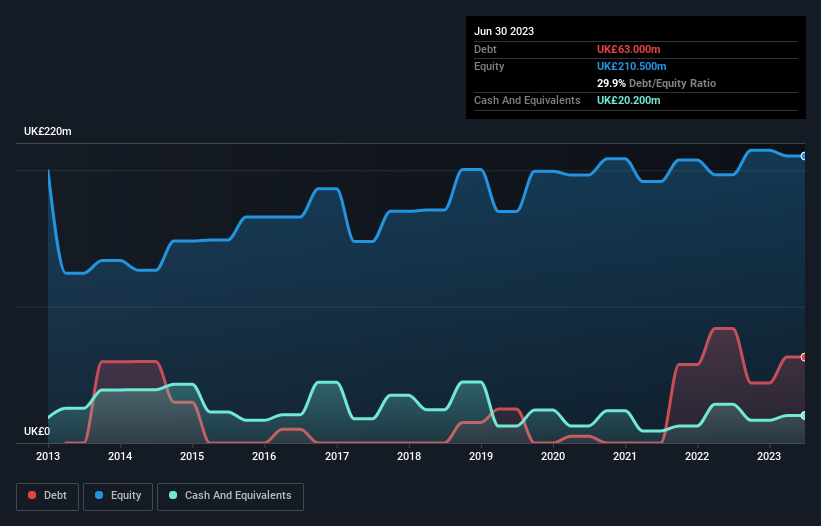Does Moneysupermarket.com Group (LON:MONY) Have A Healthy Balance Sheet?
Some say volatility, rather than debt, is the best way to think about risk as an investor, but Warren Buffett famously said that 'Volatility is far from synonymous with risk.' So it might be obvious that you need to consider debt, when you think about how risky any given stock is, because too much debt can sink a company. As with many other companies Moneysupermarket.com Group PLC (LON:MONY) makes use of debt. But should shareholders be worried about its use of debt?
When Is Debt A Problem?
Generally speaking, debt only becomes a real problem when a company can't easily pay it off, either by raising capital or with its own cash flow. In the worst case scenario, a company can go bankrupt if it cannot pay its creditors. While that is not too common, we often do see indebted companies permanently diluting shareholders because lenders force them to raise capital at a distressed price. Of course, the upside of debt is that it often represents cheap capital, especially when it replaces dilution in a company with the ability to reinvest at high rates of return. When we examine debt levels, we first consider both cash and debt levels, together.
View our latest analysis for Moneysupermarket.com Group
How Much Debt Does Moneysupermarket.com Group Carry?
The image below, which you can click on for greater detail, shows that Moneysupermarket.com Group had debt of UK£63.0m at the end of June 2023, a reduction from UK£84.0m over a year. However, it does have UK£20.2m in cash offsetting this, leading to net debt of about UK£42.8m.

A Look At Moneysupermarket.com Group's Liabilities
Zooming in on the latest balance sheet data, we can see that Moneysupermarket.com Group had liabilities of UK£154.4m due within 12 months and liabilities of UK£62.4m due beyond that. Offsetting these obligations, it had cash of UK£20.2m as well as receivables valued at UK£82.6m due within 12 months. So its liabilities outweigh the sum of its cash and (near-term) receivables by UK£114.0m.
Since publicly traded Moneysupermarket.com Group shares are worth a total of UK£1.43b, it seems unlikely that this level of liabilities would be a major threat. However, we do think it is worth keeping an eye on its balance sheet strength, as it may change over time.
In order to size up a company's debt relative to its earnings, we calculate its net debt divided by its earnings before interest, tax, depreciation, and amortization (EBITDA) and its earnings before interest and tax (EBIT) divided by its interest expense (its interest cover). This way, we consider both the absolute quantum of the debt, as well as the interest rates paid on it.
Moneysupermarket.com Group has a low net debt to EBITDA ratio of only 0.40. And its EBIT covers its interest expense a whopping 24.0 times over. So you could argue it is no more threatened by its debt than an elephant is by a mouse. Another good sign is that Moneysupermarket.com Group has been able to increase its EBIT by 23% in twelve months, making it easier to pay down debt. When analysing debt levels, the balance sheet is the obvious place to start. But it is future earnings, more than anything, that will determine Moneysupermarket.com Group's ability to maintain a healthy balance sheet going forward. So if you're focused on the future you can check out this free report showing analyst profit forecasts.
But our final consideration is also important, because a company cannot pay debt with paper profits; it needs cold hard cash. So the logical step is to look at the proportion of that EBIT that is matched by actual free cash flow. During the last three years, Moneysupermarket.com Group generated free cash flow amounting to a very robust 86% of its EBIT, more than we'd expect. That puts it in a very strong position to pay down debt.
Our View
The good news is that Moneysupermarket.com Group's demonstrated ability to cover its interest expense with its EBIT delights us like a fluffy puppy does a toddler. And that's just the beginning of the good news since its conversion of EBIT to free cash flow is also very heartening. Considering this range of factors, it seems to us that Moneysupermarket.com Group is quite prudent with its debt, and the risks seem well managed. So the balance sheet looks pretty healthy, to us. Another positive for shareholders is that it pays dividends. So if you like receiving those dividend payments, check Moneysupermarket.com Group's dividend history, without delay!
When all is said and done, sometimes its easier to focus on companies that don't even need debt. Readers can access a list of growth stocks with zero net debt 100% free, right now.
New: Manage All Your Stock Portfolios in One Place
We've created the ultimate portfolio companion for stock investors, and it's free.
• Connect an unlimited number of Portfolios and see your total in one currency
• Be alerted to new Warning Signs or Risks via email or mobile
• Track the Fair Value of your stocks
Have feedback on this article? Concerned about the content? Get in touch with us directly. Alternatively, email editorial-team (at) simplywallst.com.
This article by Simply Wall St is general in nature. We provide commentary based on historical data and analyst forecasts only using an unbiased methodology and our articles are not intended to be financial advice. It does not constitute a recommendation to buy or sell any stock, and does not take account of your objectives, or your financial situation. We aim to bring you long-term focused analysis driven by fundamental data. Note that our analysis may not factor in the latest price-sensitive company announcements or qualitative material. Simply Wall St has no position in any stocks mentioned.
About LSE:MONY
MONY Group
Engages in the provision of price comparison and lead generation services through its websites and applications in the United Kingdom.
Outstanding track record 6 star dividend payer.
Market Insights
Community Narratives



